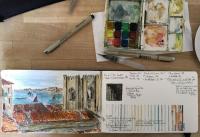 I imagine these as the “new navigators”, appropriating this controversial term to describe them in part because of their fearlessness, or perhaps more accurately their braving fear, in dis-covering, in the sense of recovering and uncovering, monstrous aspects of the past as a way to make sense of monstrous aspects of the present.
I imagine these as the “new navigators”, appropriating this controversial term to describe them in part because of their fearlessness, or perhaps more accurately their braving fear, in dis-covering, in the sense of recovering and uncovering, monstrous aspects of the past as a way to make sense of monstrous aspects of the present.
Games Without Borders
13.10.2019 | by Sharon Lubkemann Allen
 One that stands in contrast to the government’s disregard for democratic procedure – even as it claims to be pushing on the “people’s will” – was the publication of a book by University College London’ Press, with the title of The Responsibility of Intellectuals: Reflections by Noam Chomsky and others after 50 years.
One that stands in contrast to the government’s disregard for democratic procedure – even as it claims to be pushing on the “people’s will” – was the publication of a book by University College London’ Press, with the title of The Responsibility of Intellectuals: Reflections by Noam Chomsky and others after 50 years.
To read
01.10.2019 | by Paulo de Medeiros
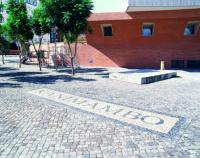 These visible and invisible movements, transparent or subterranean, brought a new vision of black cultural presence to the world in places far beyond Africa. They brought, too, a new perspective on an African continent. Portugal, which had historically opened its doors to the first waves of globalization, was looking to the future with realism and with desire.
These visible and invisible movements, transparent or subterranean, brought a new vision of black cultural presence to the world in places far beyond Africa. They brought, too, a new perspective on an African continent. Portugal, which had historically opened its doors to the first waves of globalization, was looking to the future with realism and with desire.
To read
01.10.2019 | by Margarida Calafate Ribeiro
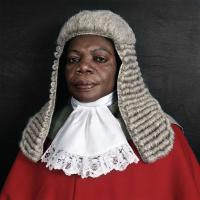 Next Future ended by opening up to the future, with a nod towards a Europe and a Eurocentrism which has hardly considered African and Latin American comic books, crime writing, science fiction or visual animation. A challenge to museums and virtual exhibitions was launched with the project-exhibition Unplace – Networked Art: Places-Between-Places.
Next Future ended by opening up to the future, with a nod towards a Europe and a Eurocentrism which has hardly considered African and Latin American comic books, crime writing, science fiction or visual animation. A challenge to museums and virtual exhibitions was launched with the project-exhibition Unplace – Networked Art: Places-Between-Places.
To read
01.10.2019 | by Margarida Calafate Ribeiro
 The mission of the EXCHANGE project (2015-2020) (2) is to reflect critically on the perpetuation of the “European dream” of a community of solidarity in which national, linguistic and cultural differences are overcome to produce a space in which citizens can move freely and safely. The surveillance technologies that the project studies have a shared feature: they are genetic machineries that seek to identify individuals for the purposes of criminal prosecution.
The mission of the EXCHANGE project (2015-2020) (2) is to reflect critically on the perpetuation of the “European dream” of a community of solidarity in which national, linguistic and cultural differences are overcome to produce a space in which citizens can move freely and safely. The surveillance technologies that the project studies have a shared feature: they are genetic machineries that seek to identify individuals for the purposes of criminal prosecution.
Games Without Borders
07.09.2019 | by Sheila Khan and Helena Machado
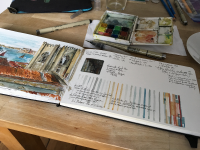 This space, therefore, has huge symbolic significance as a place to host an exhibition about contemporary prisons, and it matters that the two distinct narratives are not confounded. The Portuguese Prison Photo Project invites its viewers to consider the work of two photographers on regular prisons in Democratic Portugal of the 21st century, accompanied by other photographs of prisons selected from diverse national archives.
This space, therefore, has huge symbolic significance as a place to host an exhibition about contemporary prisons, and it matters that the two distinct narratives are not confounded. The Portuguese Prison Photo Project invites its viewers to consider the work of two photographers on regular prisons in Democratic Portugal of the 21st century, accompanied by other photographs of prisons selected from diverse national archives.
I'll visit
19.08.2019 | by Fátima da Cruz Rodrigues
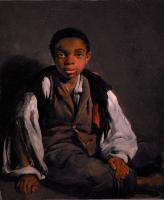 Continuing to insist on a colour-blind policy, ignoring the voices of Invisible Portuguese, will only maintain the ‘specific and extremely dangerous delusion made possible by the wilful forgetting, and negating, of Europe’s imperial past.
Continuing to insist on a colour-blind policy, ignoring the voices of Invisible Portuguese, will only maintain the ‘specific and extremely dangerous delusion made possible by the wilful forgetting, and negating, of Europe’s imperial past.
To read
29.07.2019 | by Hélia Santos
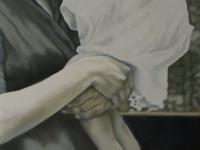 Some of these stories also show that such ‘returns’ to Angola by people of Nuno’s generation may actually be critical detours, when they give rise, upon returning to Portugal, to critical postures on the colonial persistence within Portuguese society. In this European context, could the Portuguese case represent an alternative: something that, through a post-colonial journey, may lead to a more egalitarian society that accepts a plural public retelling of the past?
Some of these stories also show that such ‘returns’ to Angola by people of Nuno’s generation may actually be critical detours, when they give rise, upon returning to Portugal, to critical postures on the colonial persistence within Portuguese society. In this European context, could the Portuguese case represent an alternative: something that, through a post-colonial journey, may lead to a more egalitarian society that accepts a plural public retelling of the past?
To read
29.07.2019 | by Irène dos Santos
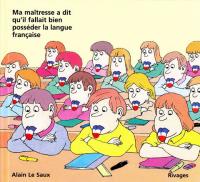 Reflecting on glotophobia also allows us to question the linguistic and cultural imaginaries of a
post-colonial or decolonial perspective. We must rethink, again, discourses that rely on a political or
ideological territorialisation sustained by references to the purity of origin, of language, of religion, or of
ideological dogma.
Reflecting on glotophobia also allows us to question the linguistic and cultural imaginaries of a
post-colonial or decolonial perspective. We must rethink, again, discourses that rely on a political or
ideological territorialisation sustained by references to the purity of origin, of language, of religion, or of
ideological dogma.
To read
13.07.2019 | by Graça dos Santos
 What remains of the Hotel Império, beyond an Asian allegory of Portugal? The clustered ruins of a building evoke the memory of an ancient, faded splendour which survives only in residues. But it is more an aesthetic image than a documented, known fact. Haunted ghosts survive of a house, more imagined than real, that never fully belonged in a Macau now disputing its precarious future through an iniquitous debate with a crushing and soulless modernization. The ideal conditions, then, to open up space for a pungent and inexorable nostalgia. It is destined to be the only thing to remain.
What remains of the Hotel Império, beyond an Asian allegory of Portugal? The clustered ruins of a building evoke the memory of an ancient, faded splendour which survives only in residues. But it is more an aesthetic image than a documented, known fact. Haunted ghosts survive of a house, more imagined than real, that never fully belonged in a Macau now disputing its precarious future through an iniquitous debate with a crushing and soulless modernization. The ideal conditions, then, to open up space for a pungent and inexorable nostalgia. It is destined to be the only thing to remain.
Afroscreen
09.07.2019 | by Roberto Vecchi
 Noting that this subject is now everywhere is to suggest that it has transcended the politico-museological sphere to become part of the public and media space. This is relatively positive, particularly if it is accompanied by actual interventions and insightful debate. Yet the process, which was never going to be straightforward, has become more complex, and acquired new problematics.
Noting that this subject is now everywhere is to suggest that it has transcended the politico-museological sphere to become part of the public and media space. This is relatively positive, particularly if it is accompanied by actual interventions and insightful debate. Yet the process, which was never going to be straightforward, has become more complex, and acquired new problematics.
To read
08.07.2019 | by António Pinto Ribeiro
 Why does Europe (still) have such trouble showing a coherent attitude in the face of discourses which legitimate racism and xenophobia? What are the masks that stop it from accepting its colonial past and understanding, once and for all, that diasporas are part of the richness of the European cultural map?
Why does Europe (still) have such trouble showing a coherent attitude in the face of discourses which legitimate racism and xenophobia? What are the masks that stop it from accepting its colonial past and understanding, once and for all, that diasporas are part of the richness of the European cultural map?
To read
22.06.2019 | by Felipe Cammaert
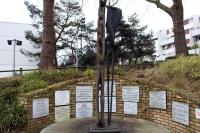 The difficult subject of a politically null war and the traumatic end of the imperial cycle have tended to produce a memory of the colonial war which – though often stressing its “tragic” and “useless” dimension – still emphasizes participation in it as a question of duty. This casts the figure of the veteran as a victim, either of the “winds of history”, or as having been forced to fight.
The difficult subject of a politically null war and the traumatic end of the imperial cycle have tended to produce a memory of the colonial war which – though often stressing its “tragic” and “useless” dimension – still emphasizes participation in it as a question of duty. This casts the figure of the veteran as a victim, either of the “winds of history”, or as having been forced to fight.
To read
16.06.2019 | by Miguel Cardina
 Hartman offers new methodological pistes for literary critics working in archives and shows how literary studies can learn from the wayward lives of women like Esther Brown to expand its understandings of creative practices. Reading Hartman reminds us of the political imperative to interrogate spaces and structures of oppression, confinement and conformism from the perspective – speculative if necessary – of those who resist them.
Hartman offers new methodological pistes for literary critics working in archives and shows how literary studies can learn from the wayward lives of women like Esther Brown to expand its understandings of creative practices. Reading Hartman reminds us of the political imperative to interrogate spaces and structures of oppression, confinement and conformism from the perspective – speculative if necessary – of those who resist them.
To read
04.06.2019 | by Alexandra Reza
 The increasing centrality of the voices of black and Afro-descendent people in Portugal, speaking out against racism and the inequality of opportunity that it generates, is the best guide to how to reconfigure an ancestry that deserves to be revived and reinvented.
The increasing centrality of the voices of black and Afro-descendent people in Portugal, speaking out against racism and the inequality of opportunity that it generates, is the best guide to how to reconfigure an ancestry that deserves to be revived and reinvented.
To read
26.05.2019 | by Bruno Sena Martins
 Os “Congos” foram vários e o “Congoísmo” revelou-se maleável na forma e conteúdo, mas estável na utilidade. Assim sendo, a invocação da sua história e da sua memória só pode ser muito cautelosa. Aspecto importante, requer ainda que se considere a sua história não-europeia, a sua natureza transnacional, transregional e transatlântica, mas também no próprio continente africano. Que não se anule diversidade de actores, instituições, “discursos” e imagens, motivações e interesses.
Os “Congos” foram vários e o “Congoísmo” revelou-se maleável na forma e conteúdo, mas estável na utilidade. Assim sendo, a invocação da sua história e da sua memória só pode ser muito cautelosa. Aspecto importante, requer ainda que se considere a sua história não-europeia, a sua natureza transnacional, transregional e transatlântica, mas também no próprio continente africano. Que não se anule diversidade de actores, instituições, “discursos” e imagens, motivações e interesses.
To read
21.05.2019 | by Miguel Bandeira Jerónimo
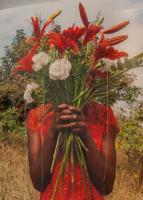 Reflection on the transgenerational dimensions of the notion of memory is, however, of course, much earlier than Hirsch’s proposal. In particular in Holocaust literature, the construction of a memory of the “not-lived”, characteristic of the postmemorial gesture, builds up a model that can be abundantly traced and that, precisely due to the power of the paradigm of confrontation with the Holocaust or the ensemble of studies on violence, trauma and memory, deserves particular attention.
Reflection on the transgenerational dimensions of the notion of memory is, however, of course, much earlier than Hirsch’s proposal. In particular in Holocaust literature, the construction of a memory of the “not-lived”, characteristic of the postmemorial gesture, builds up a model that can be abundantly traced and that, precisely due to the power of the paradigm of confrontation with the Holocaust or the ensemble of studies on violence, trauma and memory, deserves particular attention.
To read
04.05.2019 | by António Sousa Ribeiro
 Or about this faraway socialist family whose stench of betrayal sullies our ideals. Make yourself, with all the others, into a mass of militant workers. Neurotics. Gentrified. You’ve got to walk down the white stripes that cross the Open Space of shuttered hives glistening in the sun: elbowing to keep your place, emphasizing your success to excess. The law of the jungle is the strongest survive.
Or about this faraway socialist family whose stench of betrayal sullies our ideals. Make yourself, with all the others, into a mass of militant workers. Neurotics. Gentrified. You’ve got to walk down the white stripes that cross the Open Space of shuttered hives glistening in the sun: elbowing to keep your place, emphasizing your success to excess. The law of the jungle is the strongest survive.
Mukanda
27.04.2019 | by Joëlle Sambi
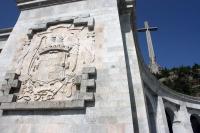 The fact that Franco is buried in sacred land, the Basilica, and his family’s decision to bring the body to Madrid’s Cathedral if he is exhumed from the Valley, a measure they bluntly oppose, has prompted the Government to search unsuccessfully for complicity in the Vatican, scaling up the controversy to a diplomatic realm. The fate of Franco’s body, still today in the Valley, has transformed into a formidable political and memorial arena questioning the ability of Spain’s democracy to defeat once and for all the resilient ghost of its last dictator.
The fact that Franco is buried in sacred land, the Basilica, and his family’s decision to bring the body to Madrid’s Cathedral if he is exhumed from the Valley, a measure they bluntly oppose, has prompted the Government to search unsuccessfully for complicity in the Vatican, scaling up the controversy to a diplomatic realm. The fate of Franco’s body, still today in the Valley, has transformed into a formidable political and memorial arena questioning the ability of Spain’s democracy to defeat once and for all the resilient ghost of its last dictator.
To read
06.04.2019 | by Francisco Ferrándiz
 Even more important are the studies by Lévy-Strauss; by members of the Latin American “decolonality” group such as Eduardo Viveiros de Castro, Walter Mignolo and Aníbal Quijanol; by anthropologists such as Aparecida Vilaça, Yvone de Freitas Leite, Elisa Loncon Antileo and Pedro Niemeyer Cesarino; and by indigenous leaders such as Ailton Krenac. The latter both denounce the extermination of native languages and also study them, trying to record them as far as is still possible. With this intellectual investment they recover the languages’ memory and, with it, a pre-colonial cultural universe.
Even more important are the studies by Lévy-Strauss; by members of the Latin American “decolonality” group such as Eduardo Viveiros de Castro, Walter Mignolo and Aníbal Quijanol; by anthropologists such as Aparecida Vilaça, Yvone de Freitas Leite, Elisa Loncon Antileo and Pedro Niemeyer Cesarino; and by indigenous leaders such as Ailton Krenac. The latter both denounce the extermination of native languages and also study them, trying to record them as far as is still possible. With this intellectual investment they recover the languages’ memory and, with it, a pre-colonial cultural universe.
To read
30.03.2019 | by António Pinto Ribeiro
 I imagine these as the “new navigators”, appropriating this controversial term to describe them in part because of their fearlessness, or perhaps more accurately their braving fear, in dis-covering, in the sense of recovering and uncovering, monstrous aspects of the past as a way to make sense of monstrous aspects of the present.
I imagine these as the “new navigators”, appropriating this controversial term to describe them in part because of their fearlessness, or perhaps more accurately their braving fear, in dis-covering, in the sense of recovering and uncovering, monstrous aspects of the past as a way to make sense of monstrous aspects of the present.  One that stands in contrast to the government’s disregard for democratic procedure – even as it claims to be pushing on the “people’s will” – was the publication of a book by University College London’ Press, with the title of The Responsibility of Intellectuals: Reflections by Noam Chomsky and others after 50 years.
One that stands in contrast to the government’s disregard for democratic procedure – even as it claims to be pushing on the “people’s will” – was the publication of a book by University College London’ Press, with the title of The Responsibility of Intellectuals: Reflections by Noam Chomsky and others after 50 years.  These visible and invisible movements, transparent or subterranean, brought a new vision of black cultural presence to the world in places far beyond Africa. They brought, too, a new perspective on an African continent. Portugal, which had historically opened its doors to the first waves of globalization, was looking to the future with realism and with desire.
These visible and invisible movements, transparent or subterranean, brought a new vision of black cultural presence to the world in places far beyond Africa. They brought, too, a new perspective on an African continent. Portugal, which had historically opened its doors to the first waves of globalization, was looking to the future with realism and with desire.  Next Future ended by opening up to the future, with a nod towards a Europe and a Eurocentrism which has hardly considered African and Latin American comic books, crime writing, science fiction or visual animation. A challenge to museums and virtual exhibitions was launched with the project-exhibition Unplace – Networked Art: Places-Between-Places.
Next Future ended by opening up to the future, with a nod towards a Europe and a Eurocentrism which has hardly considered African and Latin American comic books, crime writing, science fiction or visual animation. A challenge to museums and virtual exhibitions was launched with the project-exhibition Unplace – Networked Art: Places-Between-Places.  The mission of the EXCHANGE project (2015-2020) (2) is to reflect critically on the perpetuation of the “European dream” of a community of solidarity in which national, linguistic and cultural differences are overcome to produce a space in which citizens can move freely and safely. The surveillance technologies that the project studies have a shared feature: they are genetic machineries that seek to identify individuals for the purposes of criminal prosecution.
The mission of the EXCHANGE project (2015-2020) (2) is to reflect critically on the perpetuation of the “European dream” of a community of solidarity in which national, linguistic and cultural differences are overcome to produce a space in which citizens can move freely and safely. The surveillance technologies that the project studies have a shared feature: they are genetic machineries that seek to identify individuals for the purposes of criminal prosecution.  This space, therefore, has huge symbolic significance as a place to host an exhibition about contemporary prisons, and it matters that the two distinct narratives are not confounded. The Portuguese Prison Photo Project invites its viewers to consider the work of two photographers on regular prisons in Democratic Portugal of the 21st century, accompanied by other photographs of prisons selected from diverse national archives.
This space, therefore, has huge symbolic significance as a place to host an exhibition about contemporary prisons, and it matters that the two distinct narratives are not confounded. The Portuguese Prison Photo Project invites its viewers to consider the work of two photographers on regular prisons in Democratic Portugal of the 21st century, accompanied by other photographs of prisons selected from diverse national archives.  Continuing to insist on a colour-blind policy, ignoring the voices of Invisible Portuguese, will only maintain the ‘specific and extremely dangerous delusion made possible by the wilful forgetting, and negating, of Europe’s imperial past.
Continuing to insist on a colour-blind policy, ignoring the voices of Invisible Portuguese, will only maintain the ‘specific and extremely dangerous delusion made possible by the wilful forgetting, and negating, of Europe’s imperial past.  Some of these stories also show that such ‘returns’ to Angola by people of Nuno’s generation may actually be critical detours, when they give rise, upon returning to Portugal, to critical postures on the colonial persistence within Portuguese society. In this European context, could the Portuguese case represent an alternative: something that, through a post-colonial journey, may lead to a more egalitarian society that accepts a plural public retelling of the past?
Some of these stories also show that such ‘returns’ to Angola by people of Nuno’s generation may actually be critical detours, when they give rise, upon returning to Portugal, to critical postures on the colonial persistence within Portuguese society. In this European context, could the Portuguese case represent an alternative: something that, through a post-colonial journey, may lead to a more egalitarian society that accepts a plural public retelling of the past?  Reflecting on glotophobia also allows us to question the linguistic and cultural imaginaries of a
post-colonial or decolonial perspective. We must rethink, again, discourses that rely on a political or
ideological territorialisation sustained by references to the purity of origin, of language, of religion, or of
ideological dogma.
Reflecting on glotophobia also allows us to question the linguistic and cultural imaginaries of a
post-colonial or decolonial perspective. We must rethink, again, discourses that rely on a political or
ideological territorialisation sustained by references to the purity of origin, of language, of religion, or of
ideological dogma.  What remains of the Hotel Império, beyond an Asian allegory of Portugal? The clustered ruins of a building evoke the memory of an ancient, faded splendour which survives only in residues. But it is more an aesthetic image than a documented, known fact. Haunted ghosts survive of a house, more imagined than real, that never fully belonged in a Macau now disputing its precarious future through an iniquitous debate with a crushing and soulless modernization. The ideal conditions, then, to open up space for a pungent and inexorable nostalgia. It is destined to be the only thing to remain.
What remains of the Hotel Império, beyond an Asian allegory of Portugal? The clustered ruins of a building evoke the memory of an ancient, faded splendour which survives only in residues. But it is more an aesthetic image than a documented, known fact. Haunted ghosts survive of a house, more imagined than real, that never fully belonged in a Macau now disputing its precarious future through an iniquitous debate with a crushing and soulless modernization. The ideal conditions, then, to open up space for a pungent and inexorable nostalgia. It is destined to be the only thing to remain.  Noting that this subject is now everywhere is to suggest that it has transcended the politico-museological sphere to become part of the public and media space. This is relatively positive, particularly if it is accompanied by actual interventions and insightful debate. Yet the process, which was never going to be straightforward, has become more complex, and acquired new problematics.
Noting that this subject is now everywhere is to suggest that it has transcended the politico-museological sphere to become part of the public and media space. This is relatively positive, particularly if it is accompanied by actual interventions and insightful debate. Yet the process, which was never going to be straightforward, has become more complex, and acquired new problematics.  Why does Europe (still) have such trouble showing a coherent attitude in the face of discourses which legitimate racism and xenophobia? What are the masks that stop it from accepting its colonial past and understanding, once and for all, that diasporas are part of the richness of the European cultural map?
Why does Europe (still) have such trouble showing a coherent attitude in the face of discourses which legitimate racism and xenophobia? What are the masks that stop it from accepting its colonial past and understanding, once and for all, that diasporas are part of the richness of the European cultural map?  The difficult subject of a politically null war and the traumatic end of the imperial cycle have tended to produce a memory of the colonial war which – though often stressing its “tragic” and “useless” dimension – still emphasizes participation in it as a question of duty. This casts the figure of the veteran as a victim, either of the “winds of history”, or as having been forced to fight.
The difficult subject of a politically null war and the traumatic end of the imperial cycle have tended to produce a memory of the colonial war which – though often stressing its “tragic” and “useless” dimension – still emphasizes participation in it as a question of duty. This casts the figure of the veteran as a victim, either of the “winds of history”, or as having been forced to fight.  Hartman offers new methodological pistes for literary critics working in archives and shows how literary studies can learn from the wayward lives of women like Esther Brown to expand its understandings of creative practices. Reading Hartman reminds us of the political imperative to interrogate spaces and structures of oppression, confinement and conformism from the perspective – speculative if necessary – of those who resist them.
Hartman offers new methodological pistes for literary critics working in archives and shows how literary studies can learn from the wayward lives of women like Esther Brown to expand its understandings of creative practices. Reading Hartman reminds us of the political imperative to interrogate spaces and structures of oppression, confinement and conformism from the perspective – speculative if necessary – of those who resist them.  The increasing centrality of the voices of black and Afro-descendent people in Portugal, speaking out against racism and the inequality of opportunity that it generates, is the best guide to how to reconfigure an ancestry that deserves to be revived and reinvented.
The increasing centrality of the voices of black and Afro-descendent people in Portugal, speaking out against racism and the inequality of opportunity that it generates, is the best guide to how to reconfigure an ancestry that deserves to be revived and reinvented.  Os “Congos” foram vários e o “Congoísmo” revelou-se maleável na forma e conteúdo, mas estável na utilidade. Assim sendo, a invocação da sua história e da sua memória só pode ser muito cautelosa. Aspecto importante, requer ainda que se considere a sua história não-europeia, a sua natureza transnacional, transregional e transatlântica, mas também no próprio continente africano. Que não se anule diversidade de actores, instituições, “discursos” e imagens, motivações e interesses.
Os “Congos” foram vários e o “Congoísmo” revelou-se maleável na forma e conteúdo, mas estável na utilidade. Assim sendo, a invocação da sua história e da sua memória só pode ser muito cautelosa. Aspecto importante, requer ainda que se considere a sua história não-europeia, a sua natureza transnacional, transregional e transatlântica, mas também no próprio continente africano. Que não se anule diversidade de actores, instituições, “discursos” e imagens, motivações e interesses.  Reflection on the transgenerational dimensions of the notion of memory is, however, of course, much earlier than Hirsch’s proposal. In particular in Holocaust literature, the construction of a memory of the “not-lived”, characteristic of the postmemorial gesture, builds up a model that can be abundantly traced and that, precisely due to the power of the paradigm of confrontation with the Holocaust or the ensemble of studies on violence, trauma and memory, deserves particular attention.
Reflection on the transgenerational dimensions of the notion of memory is, however, of course, much earlier than Hirsch’s proposal. In particular in Holocaust literature, the construction of a memory of the “not-lived”, characteristic of the postmemorial gesture, builds up a model that can be abundantly traced and that, precisely due to the power of the paradigm of confrontation with the Holocaust or the ensemble of studies on violence, trauma and memory, deserves particular attention.  Or about this faraway socialist family whose stench of betrayal sullies our ideals. Make yourself, with all the others, into a mass of militant workers. Neurotics. Gentrified. You’ve got to walk down the white stripes that cross the Open Space of shuttered hives glistening in the sun: elbowing to keep your place, emphasizing your success to excess. The law of the jungle is the strongest survive.
Or about this faraway socialist family whose stench of betrayal sullies our ideals. Make yourself, with all the others, into a mass of militant workers. Neurotics. Gentrified. You’ve got to walk down the white stripes that cross the Open Space of shuttered hives glistening in the sun: elbowing to keep your place, emphasizing your success to excess. The law of the jungle is the strongest survive.  The fact that Franco is buried in sacred land, the Basilica, and his family’s decision to bring the body to Madrid’s Cathedral if he is exhumed from the Valley, a measure they bluntly oppose, has prompted the Government to search unsuccessfully for complicity in the Vatican, scaling up the controversy to a diplomatic realm. The fate of Franco’s body, still today in the Valley, has transformed into a formidable political and memorial arena questioning the ability of Spain’s democracy to defeat once and for all the resilient ghost of its last dictator.
The fact that Franco is buried in sacred land, the Basilica, and his family’s decision to bring the body to Madrid’s Cathedral if he is exhumed from the Valley, a measure they bluntly oppose, has prompted the Government to search unsuccessfully for complicity in the Vatican, scaling up the controversy to a diplomatic realm. The fate of Franco’s body, still today in the Valley, has transformed into a formidable political and memorial arena questioning the ability of Spain’s democracy to defeat once and for all the resilient ghost of its last dictator.  Even more important are the studies by Lévy-Strauss; by members of the Latin American “decolonality” group such as Eduardo Viveiros de Castro, Walter Mignolo and Aníbal Quijanol; by anthropologists such as Aparecida Vilaça, Yvone de Freitas Leite, Elisa Loncon Antileo and Pedro Niemeyer Cesarino; and by indigenous leaders such as Ailton Krenac. The latter both denounce the extermination of native languages and also study them, trying to record them as far as is still possible. With this intellectual investment they recover the languages’ memory and, with it, a pre-colonial cultural universe.
Even more important are the studies by Lévy-Strauss; by members of the Latin American “decolonality” group such as Eduardo Viveiros de Castro, Walter Mignolo and Aníbal Quijanol; by anthropologists such as Aparecida Vilaça, Yvone de Freitas Leite, Elisa Loncon Antileo and Pedro Niemeyer Cesarino; and by indigenous leaders such as Ailton Krenac. The latter both denounce the extermination of native languages and also study them, trying to record them as far as is still possible. With this intellectual investment they recover the languages’ memory and, with it, a pre-colonial cultural universe. 